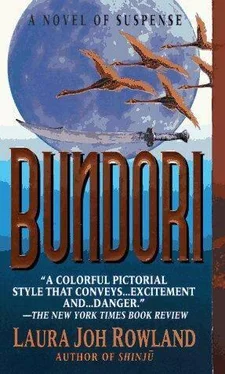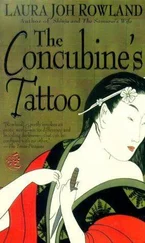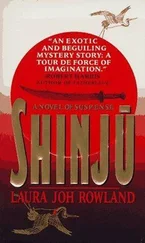The blood thundered in Sano’s head while he tried to tear Chūgo’s hands away. Seemingly made of steel, they didn’t budge. Sano retched and wheezed. Through the water that swirled across his vision, he saw Chūgo’s face: fierce, teeth bared, maniacal. The bridge seemed to sway above him, while the boat tossed beside it. Desperately Sano scissored his legs, pulling Chūgo down with him. At the same time, he grabbed for the short sword at his waist.
Obviously guessing his intention, the guard captain released Sano’s neck and intercepted his hand. Together they shot above the surface. Sano gulped a breath of air before a wave hit his face. He reached the sword, but Chūgo’s hand pinned his at his side. The captain’s muscular legs locked around Sano’s waist; his other hand pressed against Sano’s face, gradually pushing him back underwater. Sano’s strength was fading and his struggles weakened. Then despair brought inspiration. Behind Chūgo, the boat’s rocking, curved bow rose. Sano thought of the obsession that had compelled Chūgo to commit four murders and embark on this perilous journey.
“Chūgo,” he choked out, timing his words with the boat’s movements, “General Fujiwara and Lord Oda Nobunaga command you to let me go!”
The guard captain’s hold on him relaxed-just for an instant, but it was enough. With all his remaining strength, Sano threw his weight against Chūgo. Chūgo surged backward just as a wave lifted the boat. Then the boat dropped, smashing its hull against Chūgo’s crown. The captain’s face froze in an expression of puzzled surprise; his legs and hands fell away from Sano. Unconscious, he floated on his back amid rain and waves.
Sano wasted no time savoring his triumph. He had to get himself and his prisoner out of the river before they both drowned, free Yanagisawa, and tie the boat to the bridge, so a rescue party could reach them. Crooking his arm around Chūgo’s neck, Sano swam around to the stern and found the rope he’d climbed earlier. He tied it around Chūgo’s chest, then pulled himself up the rope and aboard the boat. Heaving and straining until his muscles almost tore and tears came to his eyes, he got Chūgo onto the deck…
… only to find that, while he was laboring, the boat had drifted out of reach of the bridge and down the river. Waves washed over the deck and dashed against the cabin. Sano used the rope to tie Chūgo’s hands and feet and lash him upright to a lantern pole. He slumped against the railing in despair as he scanned the deserted riverscape. Even if he anchored the boat, it might capsize before help arrived. Sano staggered around to the starboard deck, where Yanagisawa lay moaning and sobbing in a pool of water.
“Chamberlain Yanagisawa. Can you sail a boat?”
Yanagisawa abruptly quieted. Gulping in surprise, he raised his head. Rain, tears, and blood drenched his face. His mouth trembled; his swollen eyes were wells of stark fear.
“ You ,”he croaked. “Where’s Chūgo?”
Sano’s animosity toward the chamberlain dissolved into pity, leavened by a slight pang of satisfaction at seeing his enemy thus. “I’ve tied him up. He can’t hurt you. Chamberlain-”
Yanagisawa’s features contorted into the familiar mask of hatred. “I order you to untie me, Sano Ichirō,” he rasped. Safe from Chūgo, he’d recovered his authority. He wriggled toward Sano, spitting hoarse curses.
The boat was speeding down the river, smacking the waves. Lightning forks stabbed the sky. Sano repeated, “Can you sail this boat?”
“Of course not, you imbecile. I’m not a common sailor. Now free me, so I can kill you!”
Sano grabbed Yanagisawa by the armpits and dragged him into the cabin. Then, leaving the chamberlain tied, Sano hurried out to the stern. He’d never sailed a boat before, but he would have to try. Through the rain, he squinted in dismay at the bewildering web of ropes that ran from the sail, over the cabin, and through wooden fittings on the gunwales. What to do?
Sano seized the tiller and tried to turn the boat shoreward. Nothing happened. The oars, designed for a team of rowers, were too heavy and too far apart for one man to operate alone. Sano grabbed the sail’s lines and yanked, turning the flapping sheet at a diagonal. The headwind filled it, pushing the boat right-too hard. The boat heeled sharply. Sano’s heart seized as he first let out the sail, then heaved the other way and tried to brace his feet on the slippery, tilting deck.
“I’ll kill you!” Yanagisawa screamed from the cabin.
Just when Sano thought the boat would capsize, it bobbed upright. But his next attempt to change direction met with similar, near-disastrous results. He realized that he would have to correct the boat’s course gradually. He turned the sail again, this time at a slighter angle to the wind. The boat heeled, but held stable. As it raced downstream, it continued to turn. The bow aimed west and shoreward. Soon Sano saw looming toward him Edo ’s docks and warehouses. Now he heard other shouts besides Yanagisawa’s. He saw ahead the tiny figures of people waving from warehouse doors. One man separated himself from a group and ran out on the dock, jumping up and down. Recognizing Hirata, Sano laughed aloud in sheer, joyous relief. Now he was approaching his assistant on a diagonal. He waited until he neared the dock, then let loose the sail.
The boat turned downstream and drew up alongside the dock. Its bow crashed into small craft moored there; its hull scraped against the pilings. But the boat stopped. The storm still raged around Sano, yet the world stood still.
Suddenly the boat was swarming with men: a doshin and assistants; two boatmen in wide hats and straw rain cloaks; Yanagisawa’s retainers. The boatmen secured the vessel to the dock and lowered the gangplank. The police untied Chūgo-conscious now, but dazed-and led him away. Yanagisawa’s retainers rushed into the cabin.
“ Sōsakan-sama !” Hirata ran up to Sano, his face radiant with joy and excitement. “You’ve done it, you’ve caught the Bundori Killer! Come on, let’s go.”
Suddenly too weak to stand, Sano let his assistant help him down the gangplank.
“Sano Ichirō!”
Turning, Sano saw Chamberlain Yanagisawa emerge from the cabin, leaning on his retainers.
“You’ll pay for this, Sano Ichirō!” Yanagisawa shrilled, shaking his fist. Pale, disheveled, and furious, he looked like a mad demon from one of the shogun’s No plays. “I swear you’ll pay for this!”
Sano’s mind closed against the chamberlain’s threats as a temporarily forgotten longing swelled his heart.
“Aoi,” he whispered.
One month after the Bundori Killer’s capture, the shogun’s banquet hall sparkled with noisy festivity. Lanterns brightened the huge room and the garden, visible through sliding doors opened to admit the warm, summer night breeze. Beautiful attendants, both male and female, served refreshments to gaudily robed men who reclined on silk cushions in laughing, joking clusters, or moved about the room to pour liquor for one another in the customary social ritual. On the veranda, musicians performed songs from the shogun’s favorite plays. Tokugawa Tsunayoshi, seated on the dais, struck a dramatic pose and intoned:
“ I am a wanderer in life’s journey
I know not when it might end - ”
Occupying places of honor just below the dais, the Council of Elders, Chamberlain Yanagisawa, and the boy actor Shichisaburō laughed and applauded.
Sano sat alone in a corner, isolated by the terrible devastation that had followed Chūgo’s capture and destroyed much of the pleasure he’d derived from succeeding in his lord’s task. Seeing Tsunayoshi’s quizzical glance at him, he forced himself to approach the nearest group of guests, which included Hirata-his former assistant and now retainer-his former superior, Noguchi, and Magistrate Ueda. He poured them a round of sake and joined in their conversation. He must show gratitude and pretend enjoyment, even though his spirit was dying inside him.
Читать дальше












